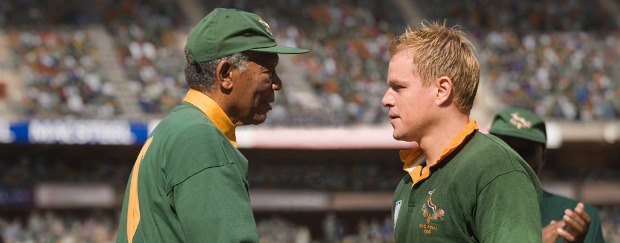Invictus
Touching and brilliant acted, Invictus stands up as both an example of Eastwood’s superior directorial instinct, and part of a larger narrative about one of the most influential leaders in the history of the twentieth century.
Plot summary
Nelson Mandela, in his first term as the South African President, initiates a unique venture to unite the apartheid-torn land: enlist the national rugby team on a mission to win the 1995 Rugby World Cup.

“I am the master of my fate/I am the captain of my soul.” The last two lines of Henley’s famous “Invictus”, the poem that Nelson Mandela kept on a scrap of paper during his incarceration at Robben Island, do well to sum up Clint Eastwood’s latest film of the same name.
Morgan Freeman stars as Mandela, and addresses the challenges he faced in a post-Apartheid South Africa still largely divided by race and class. Matt Damon plays Springboks captain Francois Pienaar who is desperate to build the moral and confidence of his team in the run-up to the 1995 Rugby World Cup, knowing their chances are slim. As is documented in John Carlin’s book “Playing the Enemy” on which Invictus is based, Mandela saw an opportunity to unite his country through the sport, and encouraged Pienaar and the team, hoping in turn they would inspire South Africans across the country whether they were black or white.
The Springboks were largely seen as a representation of “the whites” and largely dismissed by the disenfranchised black population, seen in one scene as a young black boy waits in line for some donated clothes, only to vehemently reject the Springboks jersey he is offered. Instead of disbanding the team, or changing the name and the strip as was suggested, Mandela encouraged the existing team to go out and meet young people on training days in shanty towns and engage with generation that had previously regarded them as a symbol of their own oppression.
This is clearly an Eastwood film in style, which lends itself well to the emotive subject matter – at times some of the scenes become overly sentimental, but given the nature of the story this seems largely unavoidable. The film pinpoints Mandela’s bodyguards – the group of black men who protected him throughout his presidential campaign, and the white men provided by the state as the presidential guard – as a microcosm of the larger narrative. The two groups grow to understand each other, and what may seem a rather obvious device is pulled off well to demonstrate the changing attitudes in the country with clarity and grace.
Despite being a great victory, in more ways than one, for the South Africans, the final match between the Springboks and the All Blacks was not a largely exciting game, and the film does well to inject drama into sports scenes that never feel flat, and could be enjoyed by rugby fans and novices alike. Invictus may be a film about a sport but never lapses into becoming a “sports film”, and, as with Million Dollar Baby, the action happens as much off the pitch as on.
Freeman handles Mandela’s character with great skill in playing a man unfailing in his determination to bring the two halves of South Africa together – the portrayal of his stubbornness demonstrates how successful he was in getting what he wanted against all the odds, perhaps with the exception of a reconciliation with his wife, which is briefly noted but never indulged in. Damon does an excellent job with Pienaar and his own brand of quiet determination, and in stature stands convincingly as a rugby player despite being much smaller than Pienaar was in 1995.
Clearly, Eastwood uses Invictus as an unapologetic tribute to Mandela but this works in the context of the film. Focusing on a small, but hugely significant, part of Mandela’s legacy enables the film to explore the issues in post-Apartheid South Africa without feeling too much like a history lessons, or worse, a sermon. Touching and brilliantly acted, Invictus stands up as both an example of Eastwood’s superior directorial instinct, and part of a larger narrative about one of the most influential leaders in the history of the twentieth century.











COMMENTS